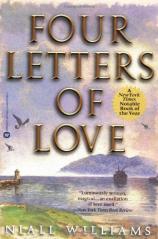Excerpt
Excerpt
Four Letters of Love

Chapter 1
When I was twelve years old God spoke to my father for the first time. God didn't say much. He told my father to be a painter, and left it at that, returning to a seat amongst the angels and watching through the clouds over the grey city to see what would happen next.
At the time my father was a civil servant. He was a thin man, tall and wiry, with bones poking out into his skin. His hair had turned silver when he was twenty-four and given him a look of age and severity which was later to deepen and increase to such an extent that he could not walk down a street without being noticed. He looked touched by something, an impression furthered by the dazzling blueness of his eyes and the fewness of his words. Although I had no brothers or sisters, from the first twelve years of my life I can remember little of what he ever said to me. The words have vanished and I am left mostly with pictures of my early childhood: My father in a grey suit coming in the front door from the office in the fog of November evenings, the briefcase flopping by the telephone table, the creak in the stairs and across the ceiling above the kitchen as he changes into a cardigan and comes down for his tea. The great shelf of his forehead floating up above the line of a newspaper in response to some question. The New Year's Day swims in the frozen sea at Greystones. I hold his towel and he walks his high frailty into the water, his rib cage and shoulders like a twisted jumble of coat hangers in an empty suit bag. His toes curve up off the stones, off the ends of his arms he seems to carry invisible bags. Seagulls don't move from him and the pale gleam of his naked body as he stands before the blue-grey sea might be the colour of the wind. My father is thin as air, when a high wave crashes across his wading thighs it might snap him like a wafer. I think the sea will wash him away, but it never does. He emerges and takes the towel. For a moment he stands without drying. I am hooded and zippered into my coat and feel the wind that is freezing him. Still, he stands and looks out into the grey bay, waiting that moment before dressing himself into the New Year, not yet knowing that God is about to speak.
He had always painted. On summer evenings after the grass was cut, he might sit at the end of the garden with a sketchpad and pencils, drawing and cleaning lines as the light died and boys kicked a ball down the street. As an eight- year-old boy with freckles and poor eyes, I would look down from my bedroom window before crawling under the blankets and feel in that still, angular figure at the end of the garden something as pure, peaceful, and good as a nighttime prayer. My mother would bring him tea. She admired his talent then, and although none of his pictures ever decorated the walls of our little house, they were frequently gifts to relations and neighbors. I had heard him praised, and noted with a boy's pride the small WC that was his mark in the corner of the pictures, pushing my train along the carpet, driven with the secret knowledge that there was no one with a dad like mine.
At twelve, then, the world changed. My father came home in his grey suit one evening, sat to tea, and listened to my mother tell how all day she had waited for the man to come to repair the leak in the back kitchen roof, how I'd come home from school with a tear in the knee of my pants, how Mrs. Fitzgerald had called to say she couldn't play bridge this Thursday. He sat in that rumpled, angular quietness of his and listened. Was there a special glimmering of light in his eyes? I have long since told myself I remember there was. It cannot have been as simple and understated as I see it now, my father swallowing a second cup of milky tea, a slice of fruit loaf, and saying, "Bette, I'm going to paint."
At first, of course, she didn't understand. She thought he meant that evening and said, "Grand, William," and that she would tidy up after the tea and let him go along now and get changed.
"No," he said quietly, firmly, speaking the way he always spoke, making the words seem larger, fuller than himself, as if the amplitude of their meaning was directly related to the thinness of himself, as if he were all mind. "I'm finished working in the office," he said.
My mother had stood up and was already putting on her apron for the dishes. She was a petite woman with quick brown eyes. She stopped and looked at him and felt it register, and with electric speed then crossed the kitchen, squeezed my upper arm unintentionally hard, and led me from the table to go upstairs and do my lessons. I carried the unexploded fury of her response from the kitchen into the cool darkness of the hall and felt that gathering of blood and pain that was the bruise of God coming. I climbed six steps and sat down. I fingered the tear in the knee of my trousers, pushed the two sides of frayed corduroy back together as if they could mend. Then, my head resting on fists, I sat and listened to the end of my childhood.
Four Letters of Love
- paperback: 288 pages
- Publisher: Grand Central Publishing
- ISBN-10: 0446674931
- ISBN-13: 9780446674935


